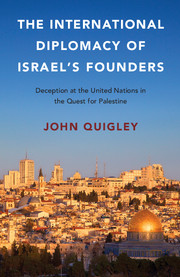 The International Diplomacy of Israel's Founders
The International Diplomacy of Israel's Founders Book contents
- Frontmatter
- Contents
- Preface
- A Note on United Nations Committees
- Abbreviations
- 1 A Public Relations Imperative
- 2 Promises, Promises
- 3 Pranks in Paris and Geneva
- 4 Courting the Commissar
- 5 Saving Europe's Jews – Our Way
- 6 Smoke and Mirrors at the YMCA
- 7 The Ship that Launched a Nation
- 8 Cocktails at the Consulate
- 9 Causing Chaos
- 10 Denying the Undeniable
- 11 A Peace-Loving State?
- 12 Joining the World with Fingers Crossed
- 13 Israel: 1, United Nations: 0
- 14 A Phantom Attack
- 15 Sabras in Sinai: Pardon My French
- 16 Suez Smoke-Screen
- 17 Mr. Nasser, Please Attack
- 18 Abba Eban's Finest Hour
- 19 Old Issues, New Lies
- 20 An Organization Turned Sinister
- 21 Prevarication Pays
- Notes
- Bibliography
- Index
9 - Causing Chaos
Published online by Cambridge University Press: 05 January 2016
- Frontmatter
- Contents
- Preface
- A Note on United Nations Committees
- Abbreviations
- 1 A Public Relations Imperative
- 2 Promises, Promises
- 3 Pranks in Paris and Geneva
- 4 Courting the Commissar
- 5 Saving Europe's Jews – Our Way
- 6 Smoke and Mirrors at the YMCA
- 7 The Ship that Launched a Nation
- 8 Cocktails at the Consulate
- 9 Causing Chaos
- 10 Denying the Undeniable
- 11 A Peace-Loving State?
- 12 Joining the World with Fingers Crossed
- 13 Israel: 1, United Nations: 0
- 14 A Phantom Attack
- 15 Sabras in Sinai: Pardon My French
- 16 Suez Smoke-Screen
- 17 Mr. Nasser, Please Attack
- 18 Abba Eban's Finest Hour
- 19 Old Issues, New Lies
- 20 An Organization Turned Sinister
- 21 Prevarication Pays
- Notes
- Bibliography
- Index
Summary
Resolution 181 brought more than verbal denunciation on the Arab side. The Arab Higher Committee resorted to the same tactic as it had after the issuance of the report of the Special Committee on Palestine. It called for a three-day commercial strike. But this time the call for a strike was taken up seriously. Violence ensued. Groups of Arabs attacked buses carrying Jews, killing a number of them. Zionist militias responded quickly. On December 10, Ben Gurion approved a policy of intimidation aimed at Arab civilians, to be implemented by the Haganah. The policy was implemented immediately. “The Jews again appeared today to be on the offensive,” wrote the New York Times on December 12, 1947, “roughly two-thirds of the incidents being initiated by them, and in their operations they showed evidence of planning, something absent in general from the Arab attacks.” A primary actor was the Irgun Zvei Leumi (National Military Organization in the Land of Israel), a well-organized Zionist force that had directed violent attacks against the British. It now shifted its attacks to the Arabs. “The day's total casualties were twenty-one Arabs and three Jews killed, reported the Times on December 13. “More than eighty Arabs were wounded and three Jews were seriously wounded.”
The UN Palestine Commission, the body that was given the unenviable task of convincing the parties to implement Resolution 181, met in January 1948 to figure out what was happening in Palestine in the wake of that resolution. Britain's UN representative, Alexander Cadogan, appeared before the Commission and characterized the situation as he saw it. “In present circumstances,” Cadogan told the Commission, “the Jewish story that the Arabs are the attackers and the Jews the attacked is not tenable. The Arabs are determined to show that they will not submit tamely to the United Nations Plan of Partition; while the Jews are trying to consolidate the advantages gained at the General Assembly by a succession of drastic operations designed to intimidate and cure the Arabs of any desire for further conflict.”
Cadogan addressed these same incidents in responding to charges that the Arabs were blockading Jerusalem's Old City, thereby cutting off residents in its Jewish Quarter. “The facts,” Cadogan said, “are that on 13 December, bombs were thrown into Arab crowds immediately outside the Damascus Gate of the Old City by Jews passing in motor cars.
- Type
- Chapter
- Information
- The International Diplomacy of Israel's FoundersDeception at the United Nations in the Quest for Palestine, pp. 81 - 91Publisher: Cambridge University PressPrint publication year: 2016
